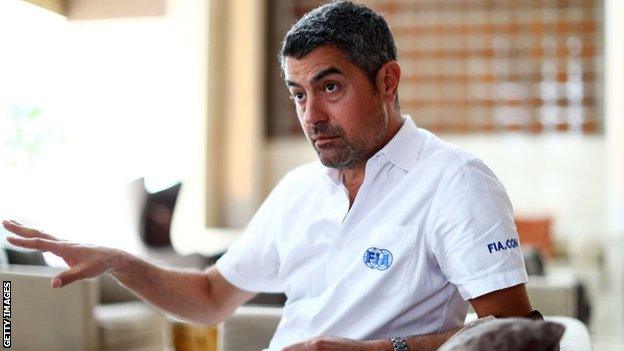Michael Masi removed as F1 race director as part of FIA restructure in wake of Abu Dhabi Grand Prix
- Published

Masi assumed the role of race director when predecessor Charlie Whiting died on the eve of the 2019 F1 season
Michael Masi has been removed as F1 race director as part of a restructure at governing body the FIA in the wake of last year's Abu Dhabi Grand Prix.
FIA president Mohammed ben Sulayem announced a series of changes as a result of the inquiry into the controversial end to last year's World Championship.
Masi failed to correctly apply the rules in a late safety car period and had a direct impact on the outcome of the title race.
Two men will now alternate in the role, while extra help will be provided to officials.
The new race directors will be Eduardo Freitas, who formerly performed the role in the World Endurance Championship, and Niels Wittich, who did so in the DTM German Touring Car Championship.
Freitas and Wittich will be assisted by F1 veteran Herbie Blash, who was the deputy race director under former FIA F1 director Charlie Whiting.
Masi assumed the role of race director when Whiting died on the eve of the 2019 F1 season.
Masi will be "offered a new position within the FIA", Ben Sulayem said.
In addition, as part of a wider restructure of race control aimed at providing a calmer environment, direct radio communications between the teams and the race director will no longer be allowed.
In Abu Dhabi, Masi came under pressure from both the Mercedes and Red Bull teams to make decisions in their favour. The huge controversy after the race arose from the fact that he seemed to follow Red Bull's suggestions, to the advantage of their driver Max Verstappen over Mercedes' Lewis Hamilton.
After Masi failed to correctly apply the rules in two ways - over the management of lapped cars and the timing of the restart - Verstappen used his fresh tyres to overtake Hamilton on old ones and win his first world title.
Prior to that, Hamilton had dominated the race and was on course to win a record eighth championship.
What effect will this have on Hamilton?
Hamilton was left "disillusioned" with F1 as a result of events in Abu Dhabi, according to Mercedes team principal Toto Wolff, and lost faith in the FIA.
It emerged in the new year that Hamilton would not commit to an F1 return this season until he had seen how the FIA planned to address the issue.
The 37-year-old is due to speak in public for the first time since Abu Dhabi at the Mercedes F1 car launch on Friday.
The FIA's decisions not only amount to substantive action but are an effective admission that mistakes were made.
The mood music from Hamilton's direction in recent weeks has indicted a likely return - he emerged on social media earlier this month, and has featured in Mercedes videos and photographs on social media.
And it can now be taken as read that he will race again in F1 this season.
What other changes have been made?
Teams will still be allowed to put questions to race control, Ben Sulayem said, "according to well defined procedures".
These are expected to be addressed to a new layer of staff in race control, to keep the direct pressure off the race director.
"I have a lot of respect for Michael for what he has done," said Ferrari driver Charles Leclerc. "He had a difficult job, especially in Abu Dhabi.
"Whatever happened it was always going to be controversial. But the FIA has made a decision, has a lot more info and I fully trust it is the right decision."
An FIA spokesman said the report into the failings at Abu Dhabi would be published at the season-opening race in Bahrain on 19 March.
The FIA will add a remote race control that will operate in a similar way to the video assistant referee in football.
Ben Sulayem said he had presented this plan to the teams at a meeting of the F1 Commission on Monday, although this is contradicted by insiders who said that only a vague outline was given there.
He added that it had been given the "full support" of the FIA World Council and Senate.
"With this plan, FIA opens the way for a new step forward in Formula 1 refereeing. Without the referees, there is no sport," he said.
"Respect and support of the referees is in the essence of the FIA. That is why these structural changes are crucial in a context of strong development and the legitimate expectations of drivers, teams, manufacturers, organisers, and of course, the fans.
"These changes will enable us to start the 2022 Formula 1 season in the best conditions, and our sport will be even more loved and respected."

'I can't wait to get started': The remarkable story of Christian Eriksen's comeback as he returns to the Premier League
'All good music makes me happy': A tasteful selection of mood-lifting songs curated by Martin Freeman
